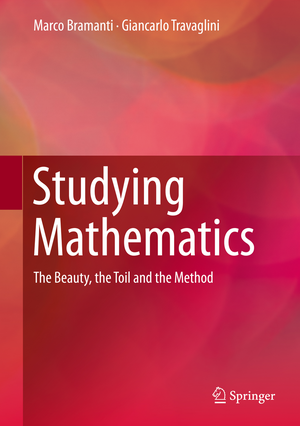Studying Mathematics: The Beauty, the Toil and the Method
Autor Marco Bramanti, Giancarlo Travaglinien Limba Engleză Hardback – 11 aug 2018
It can be used at the end of high school or during the first year of college, for personal study or for introductory courses. It aims to set a meeting between two relatives who rarely speak to each other: the Mathematics of Beauty, which shows up in some popular books and films, and the Mathematics of Toil, which is widely known. Toil can be overcome through an appropriate method of work. Beauty will be found in the achievement of a way of thinking.
The first part concerns the mathematical language: the expressions “for all”, “there exists”, “implies”, “is false”, ...; what is a proof by contradiction; how to use indices, sums, induction.
The second part tackles specific difficulties: to study a definition, to understand an idea and apply it, to fix a slightly wrong argument, to discuss suggestions, to explain a proof.
The third part presentscustomary techniques and points of view in college mathematics.
The reader can choose one of three difficulty levels (A, B, C).
| Toate formatele și edițiile | Preț | Express |
|---|---|---|
| Paperback (1) | 651.34 lei 6-8 săpt. | |
| Springer International Publishing – 20 dec 2018 | 651.34 lei 6-8 săpt. | |
| Hardback (1) | 659.20 lei 6-8 săpt. | |
| Springer International Publishing – 11 aug 2018 | 659.20 lei 6-8 săpt. |
Preț: 659.20 lei
Preț vechi: 775.53 lei
-15% Nou
Puncte Express: 989
Preț estimativ în valută:
126.15€ • 131.54$ • 104.84£
126.15€ • 131.54$ • 104.84£
Carte tipărită la comandă
Livrare economică 21 martie-04 aprilie
Preluare comenzi: 021 569.72.76
Specificații
ISBN-13: 9783319913544
ISBN-10: 3319913549
Pagini: 398
Ilustrații: XVII, 398 p. 140 illus., 11 illus. in color.
Dimensiuni: 178 x 254 x 24 mm
Greutate: 0.94 kg
Ediția:1st ed. 2018
Editura: Springer International Publishing
Colecția Springer
Locul publicării:Cham, Switzerland
ISBN-10: 3319913549
Pagini: 398
Ilustrații: XVII, 398 p. 140 illus., 11 illus. in color.
Dimensiuni: 178 x 254 x 24 mm
Greutate: 0.94 kg
Ediția:1st ed. 2018
Editura: Springer International Publishing
Colecția Springer
Locul publicării:Cham, Switzerland
Cuprins
Part 1. The Language of Mathematics.- A Few Ambiguities of Everyday Language.- To represent by Sets.- Propositions and Properties.- Proofs, Implications and Counterexamples.- Negations and Indirect Proofs.- Formulae and Indices.- Saturation of Indices and Syntactic Consistency of a Formula.- Induction and Natural Numbers.- Part 2. The Study of a Mathematical Book.- To Read a Definition.- To Understand, i.e. to Know How to Reuse.- To Learn How to Correct.- To Sift the Ideas.- To Understand, i.e. to Know How to Explain.- Part 3. Pages and Ideas.- Majorizations.- Uniqueness Proofs (Level B).- Functions and Set Theoretic Arguments.- Tiles, Polyhedra, Characterizations.- Index.
Notă biografică
Marco Bramanti is Professor of Mathematics at the Politecnico di Milano. His current research interests include linear second order partial differential equations with nonnegative characteristic form, geometry of Hörmander's vector fields, real analysis, in particular singular integral theory. He has authored numerous research papers, one research monograph, and numerous textbooks.
Giancarlo Travaglini is Professor of Mathematics at the University of Milano-Bicocca. He is the author of numerous research papers and the author or the editor of several books in the areas of abstract harmonic analysis, Fourier analysis, discrepancy theory and mathematics education. His current mathematical interests include Fourier analysis, discrepancy theory, Radon transforms and didactics of mathematics.
Textul de pe ultima copertă
This book is dedicated to preparing prospective college students for the study of mathematics.
It can be used at the end of high school or during the first year of college, for personal study or for introductory courses. It aims to set a meeting between two relatives who rarely speak to each other: the Mathematics of Beauty, which shows up in some popular books and films, and the Mathematics of Toil, which is widely known. Toil can be overcome through an appropriate method of work. Beauty will be found in the achievement of a way of thinking.
The first part concerns the mathematical language: the expressions “for all”, “there exists”, “implies”, “is false”, ...; what is a proof by contradiction; how to use indices, sums, induction.
The second part tackles specific difficulties: to study a definition, to understand an idea and apply it, to fix a slightly wrong argument, to discuss suggestions, to explain a proof.
The third part presentscustomary techniques and points of view in college mathematics.
The reader can choose one of three difficulty levels (A, B, C).
It can be used at the end of high school or during the first year of college, for personal study or for introductory courses. It aims to set a meeting between two relatives who rarely speak to each other: the Mathematics of Beauty, which shows up in some popular books and films, and the Mathematics of Toil, which is widely known. Toil can be overcome through an appropriate method of work. Beauty will be found in the achievement of a way of thinking.
The first part concerns the mathematical language: the expressions “for all”, “there exists”, “implies”, “is false”, ...; what is a proof by contradiction; how to use indices, sums, induction.
The second part tackles specific difficulties: to study a definition, to understand an idea and apply it, to fix a slightly wrong argument, to discuss suggestions, to explain a proof.
The third part presentscustomary techniques and points of view in college mathematics.
The reader can choose one of three difficulty levels (A, B, C).
Caracteristici
Prepares prospective undergraduate students for the study of mathematics Includes practice exercises that are designed to cultivate the mathematical mind Prepares students to develop the necessary skills to study a college math textbook
